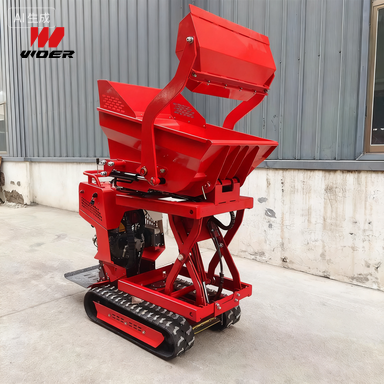Navigation
Contact us
Phone
Message

Introduction
Investing in diesel mini dumpers like hydraulic mini dumpers or rubber tracks mini dumpers can significantly boost productivity in wood processing operations. But how do you calculate the true ROI of these versatile machines? This guide breaks down the payback period for hydraulic articulated mini dumpers and self-loading mini dumpers, helping equipment buyers and operations managers make data-driven decisions. Discover key factors affecting your investment return from fuel efficiency to maintenance costs.
Understanding Diesel Mini Dumpers in Wood Processing
Diesel mini dumpers are indispensable in wood processing facilities, especially when handling heavy loads over rough terrains. Whether you opt for a hydraulic mini dumper or a model with rubber tracks, these machines provide unparalleled maneuverability and load-bearing capacity. Hydraulic articulated mini dumpers, in particular, offer enhanced flexibility, making them ideal for tight spaces common in lumber yards.
For wood processing operations, self-loading mini dumpers can drastically reduce labor costs by automating material handling. The diesel engine ensures consistent performance, even under heavy loads, which is critical for maintaining workflow efficiency.
Key Factors Affecting ROI of Diesel Mini Dumpers
When evaluating the return on investment (ROI) of diesel mini dumpers, several factors come into play. Fuel efficiency is a primary concern, as diesel engines, though powerful, can be costly to operate if not optimized. Modern hydraulic mini dumpers often feature advanced fuel injection systems that minimize consumption without sacrificing power.
Maintenance costs are another critical consideration. Rubber tracks mini dumpers, for instance, tend to have lower maintenance requirements compared to traditional wheeled models, thanks to reduced wear and tear on the undercarriage. Additionally, hydraulic articulated mini dumpers often come with sealed components that protect against dust and debris, common in wood processing environments.
Productivity gains should also be factored into your ROI calculation. A self-loading mini dumper can handle tasks that would otherwise require multiple workers, leading to significant labor savings over time.
Calculating the Payback Period
Determining the payback period for your diesel mini dumpers involves analyzing both upfront costs and operational savings. Start by listing the initial purchase price, including any financing or leasing terms. Then, estimate annual savings from reduced labor, fuel efficiency, and lower maintenance expenses.
For example, if a hydraulic mini dumper costs $25,000 and saves your operation $10,000 annually in labor and fuel costs, the payback period would be 2.5 years. However, this is a simplified calculation. Real-world scenarios should also account for variables like machine lifespan, resale value, and potential downtime.
Case Study: ROI in a Wood Processing Facility
A mid-sized wood processing plant recently replaced its manual material handling system with hydraulic articulated mini dumpers. The initial investment was $75,000 for three units. Within the first year, the plant reported a 30% reduction in labor costs and a 20% increase in productivity due to faster material transport.
Fuel consumption was also optimized, thanks to the advanced diesel engines in the rubber tracks mini dumpers. Over three years, the total savings exceeded $90,000, resulting in a payback period of just under 2.5 years. This case highlights the tangible benefits of investing in high-quality diesel mini dumpers for wood processing operations.
Choosing the Right Mini Dumper for Your Needs
Selecting the right diesel mini dumper depends on your specific wood processing requirements. For rough terrains, rubber tracks mini dumpers offer superior traction and stability. If you need versatility, hydraulic articulated mini dumpers provide excellent maneuverability in confined spaces.
Self-loading mini dumpers are ideal for operations looking to reduce manual labor, while standard hydraulic mini dumpers may suffice for simpler tasks. Always consider the machine's load capacity, engine power, and ease of maintenance when making your decision.
Conclusion and Next Steps
Investing in diesel mini dumpers like hydraulic mini dumpers or rubber tracks mini dumpers can yield significant returns for wood processing operations. By carefully evaluating factors such as fuel efficiency, maintenance costs, and productivity gains, you can accurately calculate the payback period and make an informed decision.
Ready to explore how these machines can transform your wood processing facility? Contact our team of experts today to discuss your specific needs and discover the best hydraulic articulated mini dumpers or self-loading mini dumpers for your operation.

This stunning beach house property is a true oasis, nestled in a serene coastal community with direct access to the beach.
Contact
West Street, Melbourne Victoria 3000 Australia